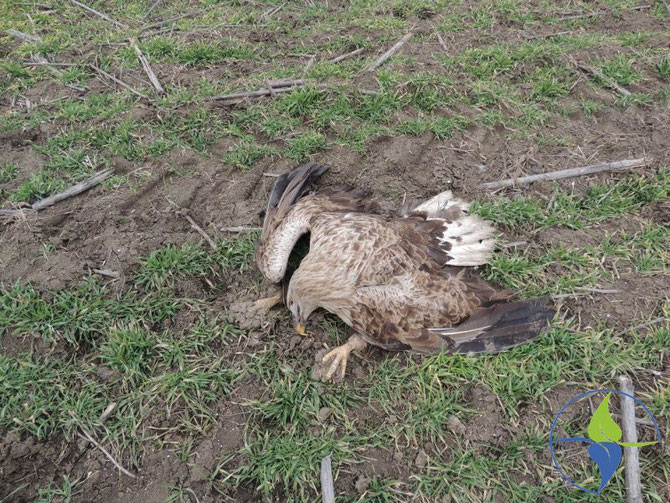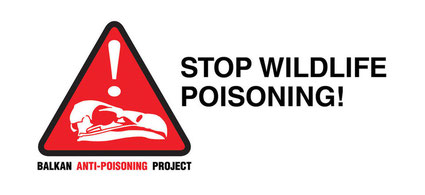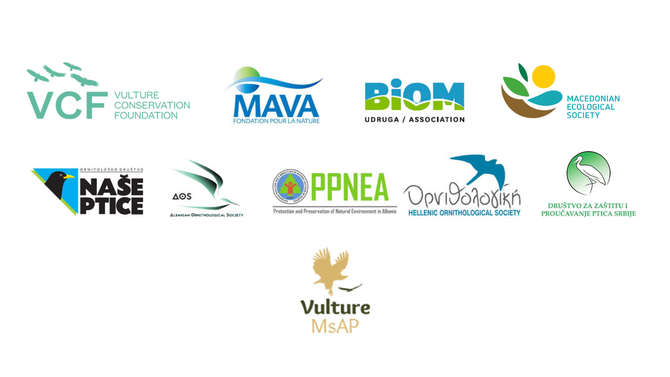
A new poisoning incident has struck Serbia again, this time in the vicinity of Novi Kneževac in northern Serbia (Vojvodina province), just 4 km from the nest of the only breeding pair of Eastern Imperial Eagle in the country. Unfortunately, different bird and mammal species were affected from this incident.
Initial investigation finds dead eagle and jackal

On the site on Sunday 23rd of February, an adult White-tailed Eagle was found dead, together with one Golden Jackal, which showed clear signs that it has been opened and eaten by animals. The typical body position of the dead eagle suggests a poisoning incident. Representatives of the police of Novi Kneževac, Environmental Inspection, Institute for Nature Conservation of Vojvodina Province (INCVP), local hunter’s association and our partners from Serbia on the Balkan Anti-Poison Project – Bird Protection and Study Society of Serbia (BPSSS) have conducted an initial investigation. Both bodies were collected by the authorities and dispatched to the Scientific Veterinary Institute of Novi Sad for conduction of toxicological analyses.
Second investigation discovers more dead animals
On the 26th of February a wider area of the incident was surveyed in much more detail with the help of the anti-poison dog unit from Magyar Madártani és Természetvédelmi Egyesület (MME) /BirdLife Hungary, with whom our colleagues from BPSSS and INCVP are partners on the PannonEagle Life (LIFE15 NAT/HU/000902). The search resulted in a total of additional 6 jackals, 1 fox, 1 Common Buzzard and 1 Magpie being found dead. Results of the toxicological analysis conducted on samples from the first dead jackal collected confirmed that the animal died due to poisoning with Carbofuran. Further toxicological analysis of the White-tailed Eagle, Common Buzzard and 2 more jackals will follow.
Wildlife poisoning in Serbia
Wildlife poisoning is still very much present and well documented, especially that related to birds, in numerous regions in Serbia, especially in the vicinity of commercial hunting grounds. The White-tailed Eagle is a strictly protected species in Serbia and its breeding population numbers around 120 pairs. Based on available data collected by our partners from Bird Protection and Study Society of Serbia within the “Report on illegal shooting, poisoning, trapping, possessing and trade of wild birds in the Republic of Serbia”, the White-tailed Eagle (Haliaetus albicilla) is the third species most affected by poisoning in the country, amounting up to 81 birds recorded poisoned in total from 2000-2017 within almost 50 separate poisoning incidents. This data clearly indicates that poisoning is by far the worst threatening factor for the population of this species in the country.
Intentional poisoning, with poison baits, to kill predators is still the most dominant type of wildlife poisoning present today in Serbia and responsible for the majority of poisoning incidents. Poison is mainly used to resolve conflicts between mammalian predators (jackals, foxes and wolves) and hunters and livestock breeders. Mostly entire animal carcasses (mostly pig and sheep) are laced with toxic substances, such as Carbofuran, and offered as bait, although recently smaller baits (pieces of meat) have been recorded as well. The baits are most often placed within commercial hunting areas or at the outskirts of rural areas and individual farmsteads.
Working together to tackle wildlife poisoning
Fast response and coordinative action by the relevant governmental authorities to poisoning incidents is a key element in combating illegal wildlife poisoning. Illegal poisoning is the most critical threat to vultures in the Balkans and is preventing their comeback in the region. One of the ways we here at the Vulture Conservation Foundation are tackling this issue is through the implementation of the Balkan Anti-Poisoning Project. In 2019, with funding from the MAVA Foundation, we announced the Balkan Anti-Poisoning Project Small Grants Programme to support other non-governmental organisations working on vulture conservation in the Balkan Peninsula and to facilitate the fight against poisoning in the region. In total, we are funding nine projects with €60,000 overall, one of which is Stop bird poisoning in Serbia, led by our colleagues from the Bird Protection and Study Society of Serbia.

The Balkan Anti-Poisoning Project is a cross-border initiative bringing together wildlife conservation organisations, governmental agencies and other stakeholder such as; hunting associations, farmers and scientists, in six Balkan countries to tackle illegal wildlife poisoning.
Funded by the Mava Foundation we aim to secure real and continued engagement of the relevant national governmental authorities in the Balkan region against illegal wildlife poisoning and increase their capacity to counteract it and working together to take positive steps to protect vultures.
The Balkan Anti-Poisoning Project is a partnership between us here at the Vulture Conservation Foundation and the Albanian Ornithological Society-AOS, Protection and Preservation of Natural Environment in Albania-PPNEA, Ornithological Society “Naše ptice”,Association BIOM, Hellenic Ornithological Society-HOS, Macedonian Ecological Society-MES and Društvo za zaštitu i proučavanje ptica Srbije.
The Balkan Anti-Poisoning Project also contributes directly into the implementation of the Vulture Multi-Species Action Plan by carrying out anti-poisoning actions in Albania, Bosnia and Herzegovina, Croatia, Greece, North Macedonia and Serbia, and is building on our work for the last decade in the Balkans through the Balkan Vulture Action Plan.



